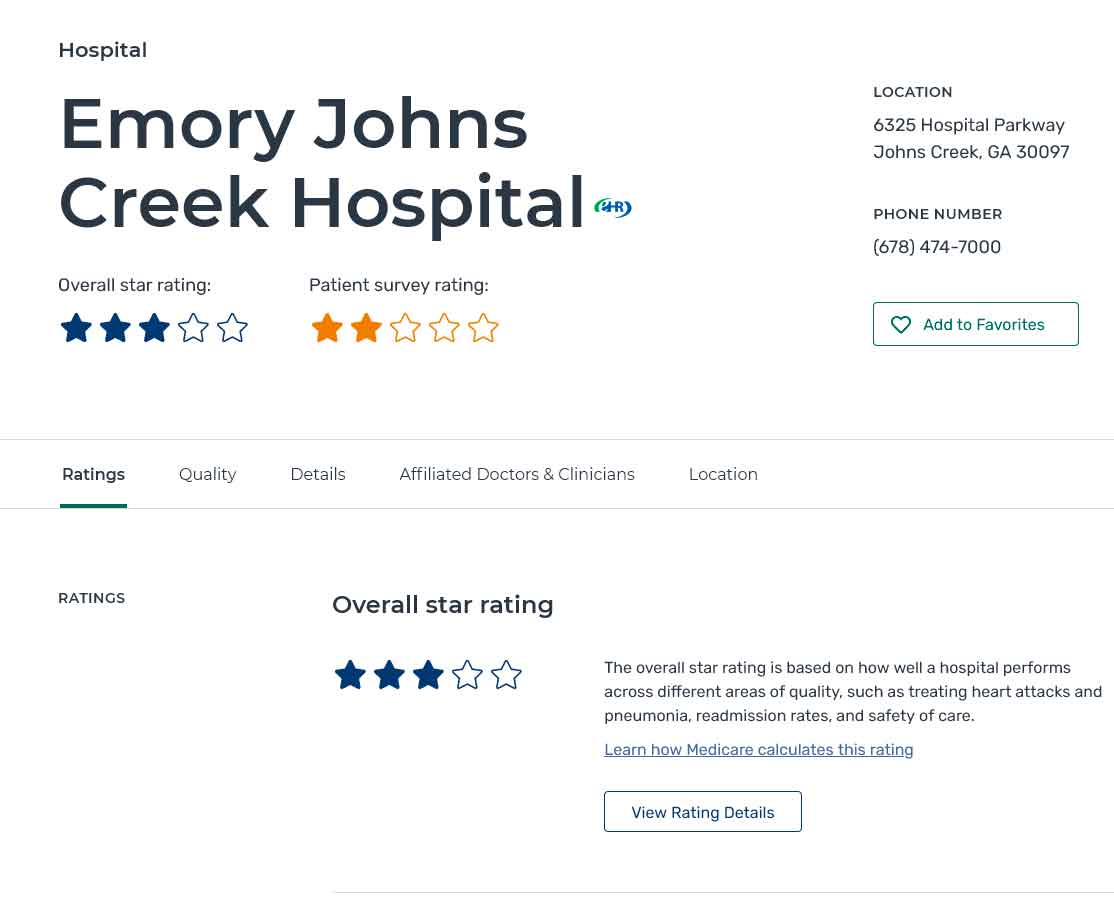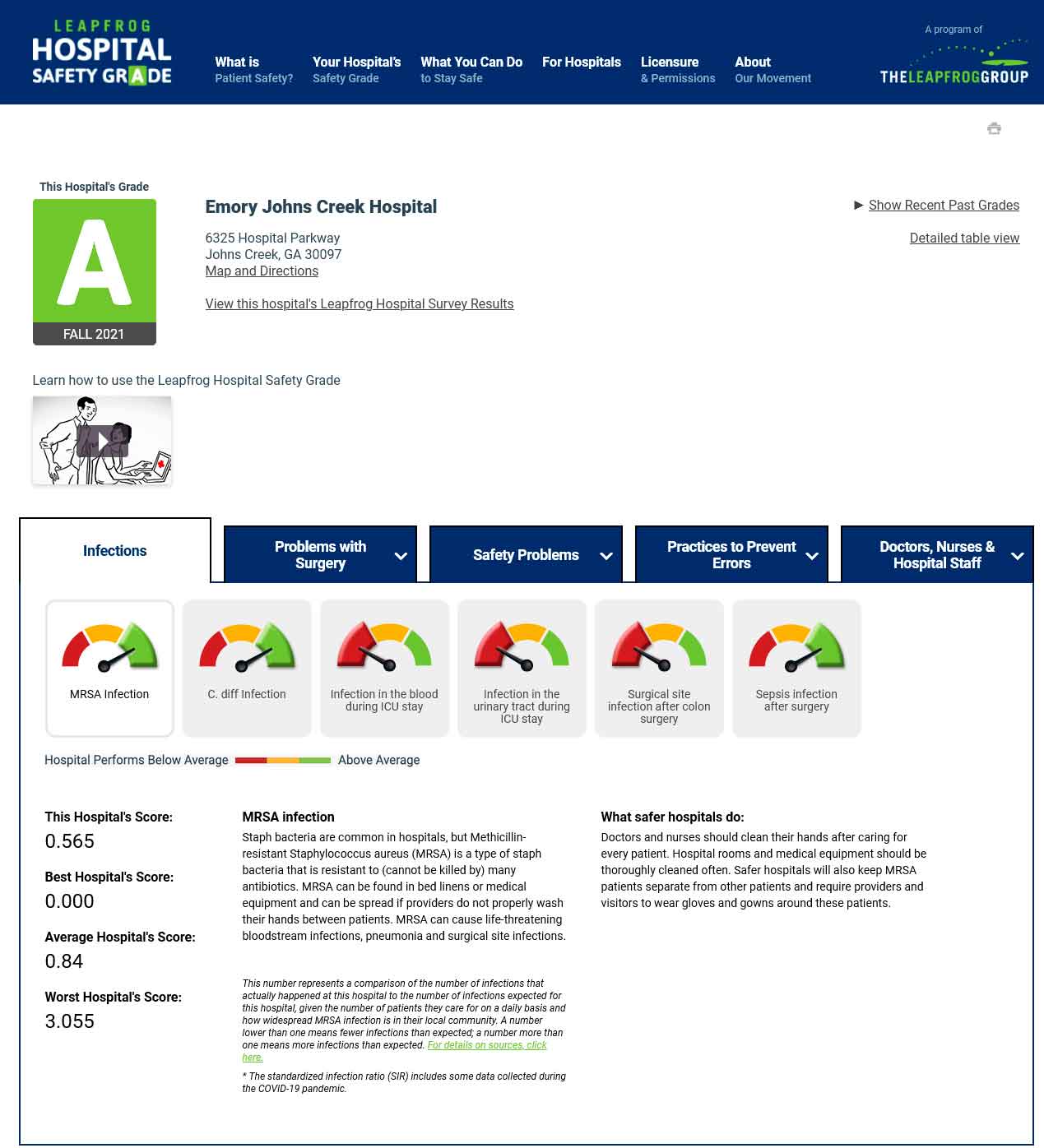Choosing a Good Hospital
Choosing a hospital could be as simple as choosing the closest hospital or the one your insurance will cover.

Choosing a good hospital is important
♦ Which hospital is the best for your needs?
Research shows that some hospitals do a better job taking care of patients with certain conditions than other hospitals.
• When you have a life-threatening emergency, always go to the nearest hospital.
However, if you’re planning to have surgery, or if you have a condition like heart disease and know you may need hospital care in the future then you need to learn about your choices.
Understanding your choices will help you make a more informed discussion.
What to consider before deciding
Do you want a hospital near family members or friends?
Does the hospital have convenient visiting hours and other rules that are important to you?
• For example, can a relative or someone helping with your care stay overnight in the room with you?
• Does the hospital accept your insurance plan? More importantly, is it in your plan’s network?
• What is the quality of care you can expect to receive?
• Will the hospital make you sick?
• Choosing a hospital should not be a last minute decision.
Knowing which hospitals in your area have the best track record treating your condition could mean the difference between a safe and speedy recovery and one with complications.
Knowing which hospitals your insurance covers is critical to avoiding severe financial hardship.
How to choose a good hospital
When it comes to choosing a hospital, most people will depend on their doctor.
Their doctor will direct them to the facility where he or she has privileges. Which means he is permitted to perform procedures at this hospital.
Your doctor may have privileges at more than one facility so if one is more convenient for you or has a better track record you need to inform your doctor.
• Don’t be afraid to ask your doctor which hospitals have the best experience with your condition? Or whether you should consider a specialty hospital, teaching hospital, community hospital, one that does research or has clinical trials related to your condition?
• Ask friends and family about their experiences and recommendations. They may not have direct experience but they may know the reputation of the hospital you are considering.
♦ A number of websites have nurses and doctors write articles telling that you should ask the hospital how they will treat you and your condition. We have not found this approach to be useful.
Most of the time we have been referred to someone with the title Patient Advocate.
The title is a bit misleading since they work for and advocate for the hospital.
• Don’t expect to hear about any negative experiences. You need to do some serious digging elsewhere for that.
There are resources to help judge the quality of hospital care, especially for common procedures such as cardiac bypass surgery. Some of these are on the internet and will allow you to search for a particular hospital.
Some states have laws that require hospitals to report data about the quality and cost of their care and post the data online.
• Information reported online many times is not complete and may not address your condition. Still, you can usually get a general idea of how well a hospital treats its patients.
♦ The Affordable Care Act has requirements for hospitals to provide more data on patient experience and outcomes.
Data on infection rates and how well hospitals adhere to recommended guidelines for certain procedures is important. This is still a work in progress but a good bit of data is available.
• Don’t confuse Outpatient Surgical Care Centers with hospitals.
Some are operated by hospitals or even operate inside of the hospital itself. Most are independent of hospitals.
• Most out-patient surgical centers aren’t required to report infections or other complications, like hospitals are.
Compare hospitals
This should be your first step in you online search.
The U.S. Centers for Medicare & Medicaid Services (CMS) collects the majority of the data. Hospitals that accept Medicare are required to report.
The CMS shares this data so some online sites repackage the data into a more attractive format. Some even go so far as to try to sell reports based off this data.
The data is readily available and free at the website called Compare Care.
Here you can search by zip code or facility name. View the report for the hospital you are interested.
The hospital will have a star rating for overall quality. The more stars the better.
There are several tabs to click on and see data collected for various outcomes. Patient experiences is one and of course complications & deaths is an important one to review.
Below is a screen shot of a major hospital in Atlanta, Georgia.

LeapFrog
Another nice website with a cute name.
Unlike the CMS site the LeapFrog data can be a bit limiting because it is voluntary.
Many hospitals are not yet willing to answer all survey questions posed to them by LeapFrog. The question becomes why?
Leapfrog Group is a consortium of corporations and public agencies that purchase health care for their employees.
They have surveyed more than 1,300 hospitals across the country on quality and safety practices, including ICU staffing and computerized records.
You can search its online database to see how your local hospitals performed.
Go to LeapFrog’s website and click on the Search hospital and surgery center ratings button. Searching by zip code is the easiest.
The results are presented as a long list of events covering patient care and safety.
• You may want to select the option to show hospitals that did not respond to Leapfrog's request for patient safety and quality date
The main web page also has a separate link at bottom of the page to Leapfrog Hospital Safety Grade.
Here you can see most of the same information but in a more colorful format. And also a bit more disturbing.

Others - less useful
Joint Commission has a searchable database. Joint Commission is a nonprofit group that inspects and accredits many hospitals and other organizations.
They issue what they call a “Gold Seal.” It is not clear how valuable this is to actual consumers.
You can search the site by zip code and download a report on a hospital in your area. Their reports read more like an advertisement of services and less about outcomes.
The Commonwealth Fund created a site called Why Not The Best in 2015. It collects performance data on hospitals nationwide.
The site was transferred to another nonprofit called IPRO. The site is pretty bare-bones. It is not really useful for consumers.
Reports on hospitals are pretty scant. Most of the time just a quality rating percentage and no details.
The address is: http://www.whynotthebest.org We don't link to it because it causes some odd browser action that most people would find annoying.
Consumers' CheckBook has a website but it is not free.
Most people are not familiar with Consumers' Checkbook. It is a nonprofit that has been around since 1974.
They require a $28 annual fee to search their data. They say it is because they don't accept advertising or kickbacks for referrals.
They have partnered with a few Marketplace sites to provide insurance plan comparison tools.
They have a scattering of information on a variety of healthcare providers plus dentists. They don't cover all of the U.S. but they may provide some information in your area.
Their site is CheckBook.org .
Review Sites
There are a number of review sites where people leave comments about their experiences.
Most of the sites focus on doctors but some have reviews on hospitals.
Some present data on hospitals which is mainly pulled from CMS records.
We devoted a separate page to them - Popular Doctor Review Sites.
Will my insurance pay?
When we have a serious illness or complicated procedure everyone wants to receive the best treatment. But the best usually comes with a steep price.
That price gets blown out of proportion if your insurance does not cover the hospital you use.
♦ It is critical to understand which hospitals in your area are covered by your insurance?
If you have an HMO or EPO plan, the number of hospitals can be severely restricted. If you are not familiar with HMO plans you can read more about them at Types of Health Insurance. HMO and EPO plans have a limited number of network hospitals.
♦ You can use a hospital that is not in the network but unless your visit is a true emergency your insurer will not pay.
The words true emergency can be argued over and over.
You can be sure your insurance company will look long and hard at any huge emergency charges. If you want to avoid complications, know where your network hospital is and try to go there if it is safe to do so.
• PPO and POS plans have more options. These plans have network hospitals but they also allow you to use hospitals that are out-of-network.
PPO plans cost more than HMO plans but they provide greater flexibility.
Keep in mind, if you use an out-of-network hospital PPO plans shift more of the cost to the patient in the form of higher copay and out-of-pocket maximums.
♦ Traveling out of your local area might be the best in some cases.
Maybe you need an unusual or difficult procedure or operation that your local doctors cannot perform. Or you want to enroll in a clinical trial that's is in another state.
Your insurer might insist you use local hospitals and refuse to give approval to go outside your network’s area.
• Should you run into this situation you may have the option once a year to switch insurance plans.
♦ People with individual health insurance and Medicare have an open enrollment period each fall.
Most employer sponsored health coverage has an open enrollment period also but the choice of plans is usually very limited.
If you are near the end of the year and can wait, considering a switch to a more flexible plan may be a speeder option than getting into a protracted fight with your insurance company.
Is my local hospital in network?
Call your insurance company and ask. The number to call will be listed on the backside of your insurance card.
Your insurer will tell you which hospitals are in your network. You can find this information at your plan’s website but website information is often out of date.
• Providers come and go from plan’s all the time.
♦ It is always good practice to call the hospital you are considering and confirm they are in fact in your plan’s network. When asking the hospital staff if they accept your insurance be sure to ask about your particular plan.
Your plan's ID or Group number will be listed on your insurance card. Many larger insurance companies like BlueCross BlueShield have a variety of plans.
The hospital may accept most but not all. Always, ask. And always write down the name of the person you spoke to.
Approval / Authorization
Do you need permission from your health plan (like a preauthorization or a referral) before you are admitted for hospital care? In most cases, your doctor will make this request.
If you are going to the hospital for testing, the hospital will receive your doctor's order and the hospital will usually request authorization. They want to know how much to collect when you arrive.
If you are going the hospital’s outpatient section most procedures will require preauthorization. This would be initiated by your doctor performing the procedure.
♦ Never assume someone else did this automatically. Ask your doctor and ask your insurance company. Ask before your go.
Conclusion
First decide what would be best for you. Do a little research until you reach your comfort level.
And then before deciding … visit.
• Visit the hospital and observe how it looks and smells. Is it maintained and clean?
Talk to some of the staff. Ask yourself, do the people working there seem friendly and relaxed?
Is this a facility with a healthy work environment?
If it is, your chances of having a better experience and a successful health outcome just went up.

